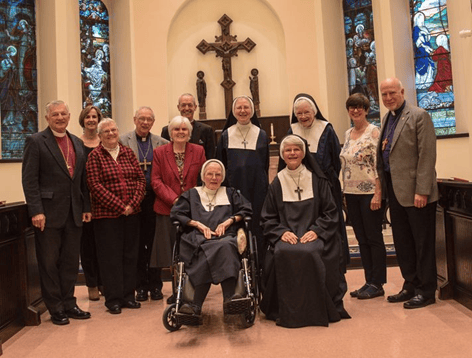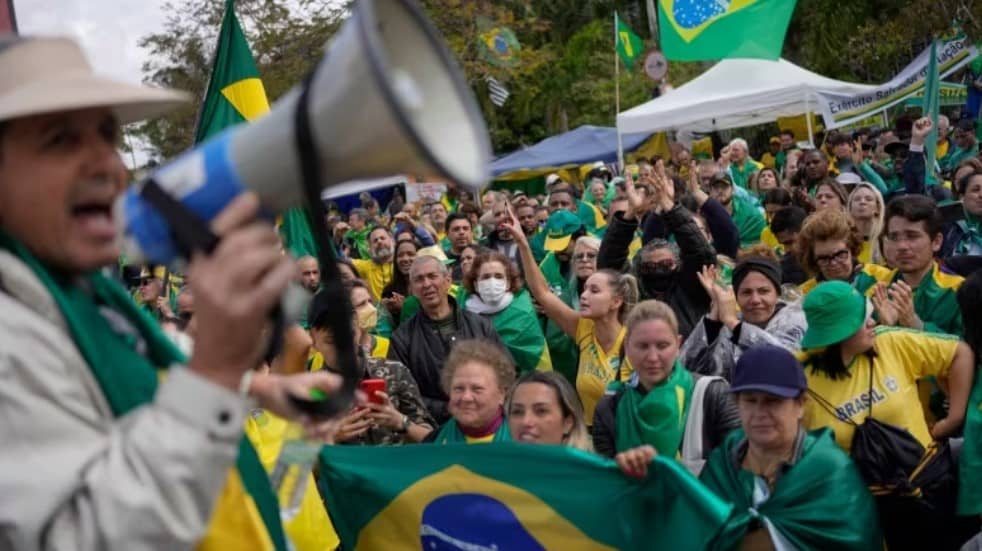KANSAS CITY, Kansas — A bold vision to form a brotherhood of permanent deacons for pro-life ministry — the first of its kind — became a reality this fall when Kansas City Archbishop Joseph F. Naumann signed a decree approving the clerical association Deacons of Hope.
The two founders, Deacons Kevin Cummings of the Archdiocese of Kansas City in Kansas and Doug Hemke of the Diocese of Kansas City-St. Joseph, hope that permanent deacons in and beyond the two dioceses will join them.
This brotherhood of deacons began as a friendship between the two men.
Cummings was originally incardinated with the Diocese of Kansas City-St. Joseph. It was during formation that the two met, and by ordination in 2011, they had become friends.
Hemke said he met Cummings during the first weekend of formation and the two became fast friends believing there was something they would be called to do together.
“Sure enough, eight years later, it became clear what our calling was. Why God called two leaky old wineskins like us, I don’t know,” he joked.
Cummings, a retired dentist, moved to Kansas three years ago and asked to be incardinated into the Kansas City Archdiocese. He was assigned to his home parish of Curé of Ars in Leawood. Hemke, a retired stockbroker, was assigned to his home parish, too, St. James in St. Joseph, Missouri.
Both men do the traditional diaconal duties at their parishes, which include presiding at weddings, funerals and baptisms, as well as preaching and assisting priests at Mass.
But they also had hearts for pro-life ministry. About three years ago, they began to raise funds for the Gabriel Project and helped establish the St. Mary’s Home for Mothers in Liberty, Missouri. They wanted to do even more but wondered how.
By 2019, they had an idea.
Cummings said they decided there are deacons in many parishes. “A lot of them are overworked and some of them are underworked. Few of them get to do the outside ministry they really want to do because they don’t have a plan. They don’t decide what their emphasis is or what they’re passionate about.”
He said he and Hemke decided that pro-life ministry is what drives them.
“We’re in our 60s and don’t have a lot more time to do this, so let’s get to it,” he said they decided, making plans for Deacons of Hope to be an infrastructure for all the parishes.
“Our goal is to uphold the dignity of individual life from conception to natural death and whatever that entails in between,” said Hemke. “That means building a house with Habitat for Humanity, a Walk with Moms, a vigil against the death penalty — yeah, it’s that.”
“Aside from just having a ministerial preference for the unborn, we also serve the poor, the imprisoned, the marginalized, the oppressed, the sick and the aged. Whatever we need to do to uphold the image and likeness of God in humanity is what we do. Everything in between is a part of the pro-life ministry of the Deacons of Hope,” he told The Leaven, newspaper of the Archdiocese of Kansas City.
Forming an association gives them unity of purpose and structure for mutual support and organizing. It also gives them access to parish pro-life mechanisms.
“Deacons are always looking for causes to sink their teeth into,” said Hemke.
The two eventually sought help from Rome and then Naumann and Bishop James Vann Johnston of Kansas City-St. Joseph in Missouri, their respective ordinaries. Both leaders gave their strong support.
The deacons got the help of Father Joseph Arsenault, a canon lawyer in the Kansas City archdiocesan tribunal, to draw up the bylaws and statutes of the Deacons of Hope and follow the correct procedure to form such an association.
“He was most helpful,” said Hemke. “We couldn’t have done it without him.”
Although the Deacons of Hope will be ecumenical in its support of pro-life activities and ministries, membership in the association is limited to Catholic permanent deacons.
So far, in addition to the two co-founders, the Deacons of Hope has four other members. Deacon Cummings is the first general moderator of the association until their first general assembly, which must be convened within two years.
Now that the association has gotten the church recognition it needs, it will work toward getting the legal and practical steps finished on the corporate level, such as forming a board of directors, getting a tax identification number, becoming a nonprofit tax-exempt organization and filing its bylaws with the Missouri Secretary of State.
“Now we’re in the active recruiting stage, developing awareness and reaching out to our brother deacons,” said Hemke who added: “Potentially, it’s an international organization.”
Bollig is a reporter at The Leaven, newspaper of the Archdiocese of Kansas City.

















